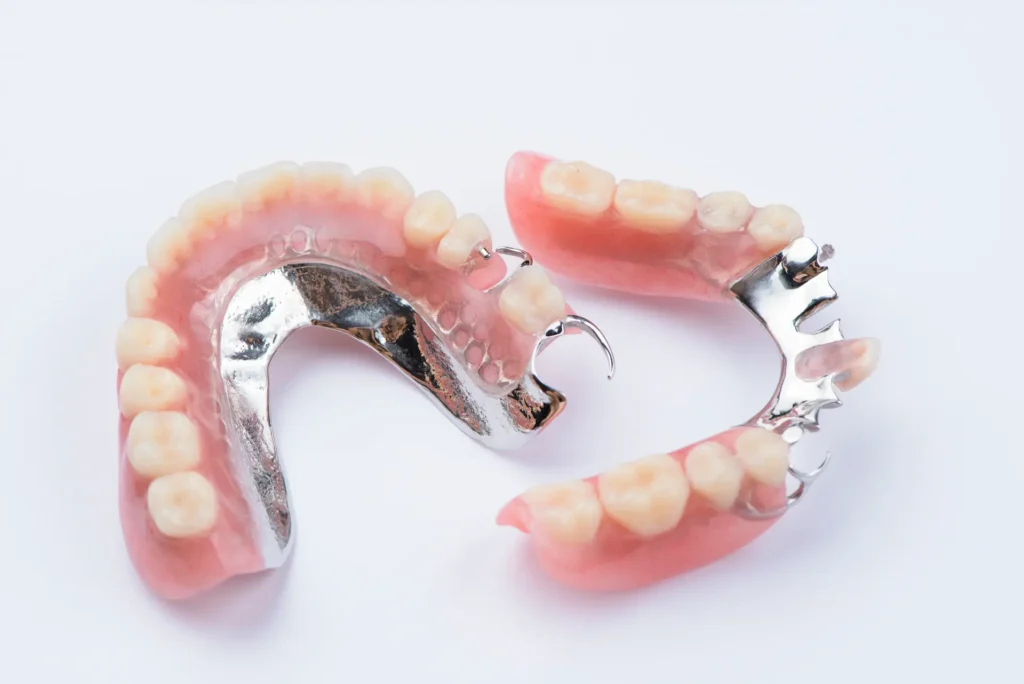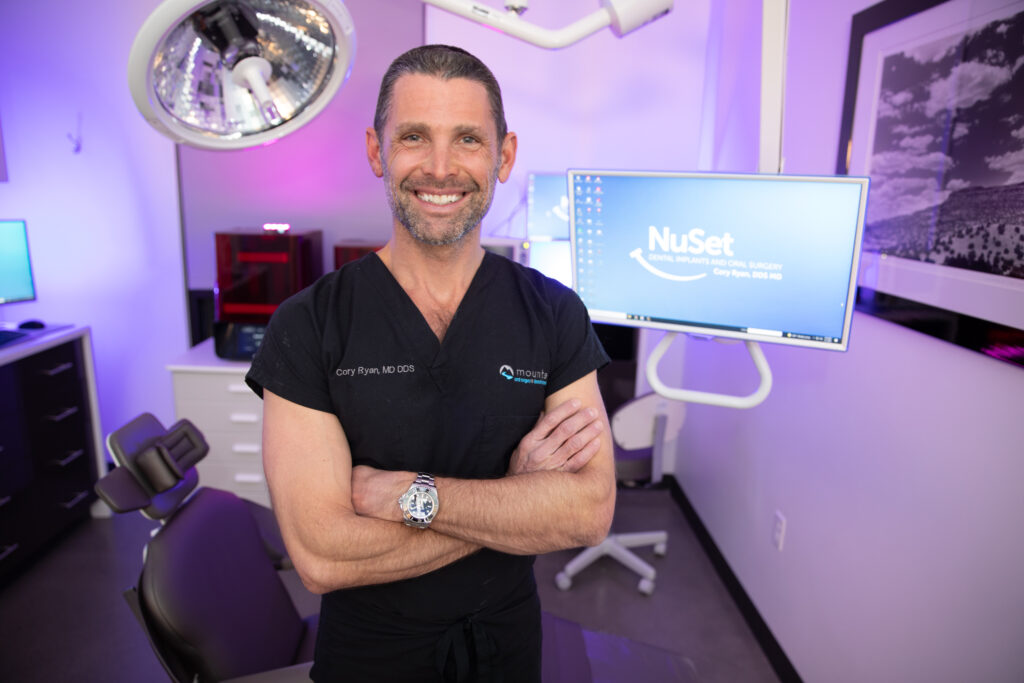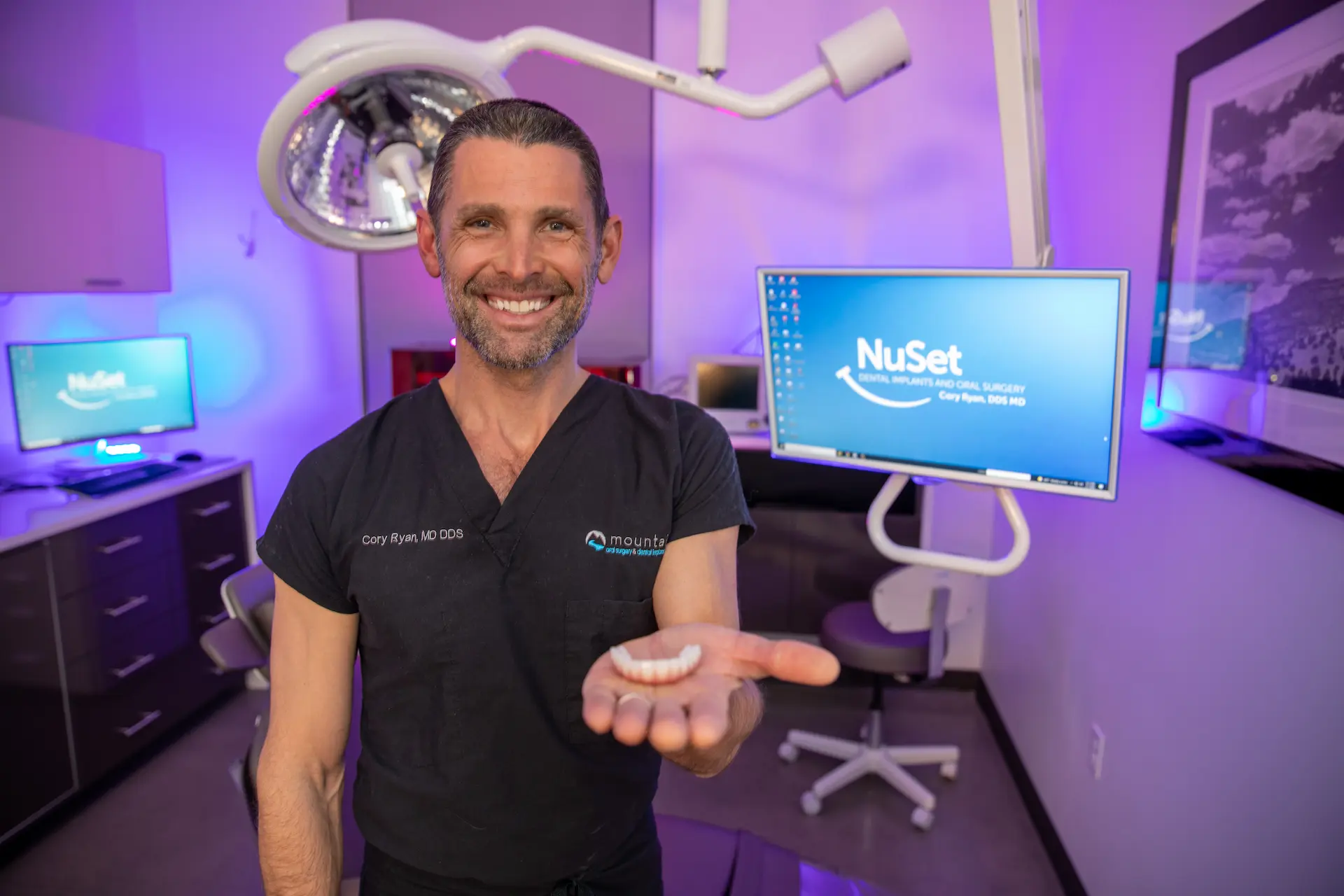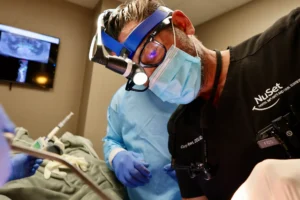When it comes to the task of replacing missing teeth, there are several choices to consider, with dentures and implants being among the most popular options. The decision you ultimately make will be influenced by a range of factors, including cost, personal preference, and the current state of your jawbone and existing teeth.
Despite their similar objectives, dentures and implants differ significantly in certain aspects.That is why having a comprehensive discussion with your dentist about these options is essential. But in the meantime, we’ll help guide you through the basics you’ll need to know.
Let’s take a look at the pros and cons of each option to help you make an informed decision.
Understanding Dental Implants
Dental implants are a modern and popular solution for replacing missing teeth. An implant is a small, sturdy post made of titanium surgically placed into your jawbone. Over time, this post will fuse with your jawbone, creating a solid foundation for the artificial tooth, or crown, that will be attached to it.
A dental implant consists of three main components:
- The Implant: This is the titanium post that’s inserted into the jawbone. It acts as the root of your new tooth.
- The Abutment: Attached to the implant, this piece serves as a connector between the implant and the crown.
- The Crown: This is the visible part that looks like a natural tooth. It’s usually made of ceramic or porcelain and is custom-made to match the color and shape of your natural teeth.
Implants are a popular choice because they look and function like natural teeth. They are designed to be a long-lasting solution, integrating with your bone structure to provide strong support for your new teeth.

Advantages of Dental Implants
Dental implants come with several benefits, making them a choice for many people. Here are some of the advantages of dental implants:
Dental Implants are Long-Lasting and Durable
One of the most significant benefits of implants is their longevity and durability. 90-98% of Implants are designed to last more than 10 years, often a lifetime, with proper care. The titanium used in implants is incredibly strong and resistant to decay and gum problems, making them a long-term solution for tooth replacement.
They Look and Feel Natural
Dental implants are crafted to look and feel like your natural teeth. They are custom-made to match the color and shape of your teeth, ensuring they blend in seamlessly. This natural appearance can boost your confidence and self-esteem, as it feels like having your natural teeth back.
They Improve chewing function
With dental implants, you can enjoy your favorite foods without worry. They function like your teeth, allowing you to chew with the same force you could use with your natural teeth. This improves your eating habits and contributes to a better overall quality of life.
Implants also have a positive impact on oral health. Since they don’t require altering the neighboring teeth, as a bridge might, more of your teeth are left intact, which is beneficial for your long-term oral health.
Factors to Consider Before Opting for Dental Implants
Before deciding on dental implants, it’s vital to consider factors that can influence your choice. Here are the key factors to consider:
Eligibility and Health Requirements
Not everyone is a good candidate for dental implants. Healthy gums and a strong jawbone are vital for the success of the implant. The process involves surgery, so being in good overall health is also important.
Cost
Dental implants can be more expensive than other tooth replacement options. The cost varies depending on the number of implants needed and the complexity of the procedure. A single implant could cost between $1200-$2,200. While they are an investment, their durability and long-term benefits can make them cost-effective over time.
Procedure Timeline
The process of getting dental implants is more involved and time-consuming than other dental procedures. It requires surgery to place the implant in the jawbone, followed by a healing period that can last several months. After the implant has fused with the jawbone, additional appointments are needed to place the abutment and the crown. Understanding the steps and time commitment involved can help you decide if this is the right option.
Considering these factors will help you make a well-informed decision about whether dental implants are right for your dental needs.
What Are Partial Dentures?
Partial dentures are a common solution for replacing one or more missing teeth, especially when some natural teeth remain. They consist of replacement teeth attached to a gum-colored plastic base, which is sometimes connected by a metal framework that holds the denture in place in the mouth.
There are two main types of partial dentures:
Removable Partial Dentures
These are the most common types. Removable dentures are designed to be taken out and cleaned easily. Removable partial dentures usually have clasps that attach to your natural teeth, and these clasps can be concealed for a more natural appearance.
Fixed Partial Dentures (also known as Dental Bridges)
These are attached to the teeth on either side of the space left by the missing tooth. A bridge consists of crowns for the teeth on either side of the gap and a replacement tooth in between.
Partial dentures are not just a cosmetic device; they help prevent your remaining teeth from shifting and can help with chewing and speech. By filling the gaps, they can also support the facial muscles and prevent the face from sagging.

Advantages of Partial Dentures
Partial dentures offer several benefits, particularly for those who may not be suitable candidates for dental implants. Here are some of the key advantages:
- They are affordable and cost less than dental implants.
- They are non-invasive and require no surgical procedure.
- Partial dentures can be adjusted or modified as your oral health changes.
- They help improve the functionality and aesthetic of your smile.
Factors to Consider Before Opting for Partial Dentures
There are several factors to consider when considering partial dentures as a solution for missing teeth. These factors will help you determine if partial dentures are the best fit for your needs:
Maintenance and Repairs
Partial dentures require regular cleaning and maintenance. They need to be removed and cleaned daily to maintain oral hygiene and prevent damage to the denture and your remaining teeth. Additionally, dentures may need adjustments or repairs over time, which can require additional dental visits.
Comfort and Fit
Initially, new partial dentures may feel uncomfortable or awkward. It often takes time to get used to the feel of dentures in your mouth. The fit is crucial for comfort and function, so adjustments by your dentist might be necessary to ensure a proper fit.
Potential Impact on Speech and Eating
When you first start wearing partial dentures, you might notice changes in your ability to speak and eat. It can take some time to adapt to the presence of dentures, and you may need to practice speaking and eating to regain your comfort level. Most people adjust to these changes quickly, but it’s important to be patient and give yourself time to adapt.
Understanding these factors is essential in making an informed decision about whether partial dentures are the right choice for you. Consulting with your dentist is also important to ensure that you consider all aspects of your dental health and lifestyle needs.
The Dental Implant vs. Partial Denture Comparison
When comparing dental implants and partial dentures, it’s important to consider several key aspects to determine which is more suitable for your needs.
| Dental implants | Partial dentures | |
|---|---|---|
| Functionality and Aesthetics | Natural look and feel | Restores function, less natural feel |
| Cost and Insurance | Higher initial cost, varies with insurance | More affordable, often better insured |
| Procedure and Recovery | Lengthy process with surgery | Quick, non-surgical option |
| Durability and Longevity | Designed to last a lifetime | Require adjustments over time |
| Oral Health Impact | Preserve natural teeth, improve bone health | May affect remaining teeth over time |
| Comfort and Maintenance | Comfortable like natural teeth, low maintenance | Require daily removal and cleaning |
| Adaptability to Changes in Oral Health | Permanent, not adjustable | Can be adjusted or modified |
Dental Implant vs. Partial Denture: Choosing the Right Option for You

When deciding between dental implants and partial dentures, it’s crucial to consider your unique situation. Here are some factors to help you determine the best option:
Oral Health and Bone Density
If your jawbone is strong and healthy, dental implants could be a great option. They require a good bone structure for support. If you have weaker bones or issues with oral health, partial dentures might be more suitable.
Budget and Insurance
Consider your budget and what your insurance covers. Dental implants are more costly initially but can be a better investment in the long run. Partial dentures are less expensive upfront and are often more likely to be covered by insurance.
Personal Preferences
Think about what matters most to you. If you want a solution that feels and looks like your natural teeth and you are willing to invest more, dental implants are ideal. If you prefer a less invasive and more budget-friendly option, consider partial dentures.
Remember, the best choice depends on your specific dental needs, lifestyle, and personal preferences. It’s also essential to have a detailed conversation with your dentist. They can provide personalized advice based on oral health and guide you toward the right decision.
Why You Should Consult a Dentist Before Making a Decision
Talking to a dentist before deciding between dental implants and partial dentures is important. Here’s what you get from consulting with a dentist:
Expert Evaluation
A dentist can thoroughly assess your oral health, including jawbone density, gum health, and the condition of remaining teeth. This professional evaluation is crucial for determining which option is suitable for you.
Personalized Recommendations
Every mouth is different. A dentist can provide recommendations tailored to your specific needs and circumstances. They will consider your overall health, lifestyle, and dental history.
Dentists can explain the procedures, recovery times, and care requirements for both implants and dentures. They can also address any concerns or questions you might have.
A dentist can guide you to an option that addresses your current needs and benefits your overall dental health in the long run.
Are you ready to discuss your options with an expert?

When choosing between dental implants and partial dentures, it’s essential to consider factors such as your oral health, budget, personal preferences, and lifestyle. Dental implants offer a durable, natural-looking solution for those with good oral health and bone density. On the other hand, partial dentures are a cost-effective, less invasive option suitable for individuals with varying oral health conditions.
Both options have unique benefits and can significantly improve your quality of life by enhancing your ability to eat, speak, and smile confidently. The decision is personal and should be made after careful consideration and consultation with a dental professional.
Book a no-cost consultation with us at NuSet Dental Implants today to get started!
Frequently Asked Questions
Are partials or implants better?
The choice between partials and implants largely depends on individual circumstances. Dental implants can be a better choice if you have strong jawbones and good oral health due to their durability and natural feel. However, if budget constraints are a concern or if the jawbone and surrounding teeth’ condition aren’t ideal for implants, partial dentures can be a more suitable and cost-effective option. They’re less invasive, quicker to fit, and easier to adjust or repair.
Why would a dentist recommend a partial rather than implants?
A dentist might suggest partial dentures over implants for several reasons. If a patient’s jawbone isn’t dense or healthy enough to support an implant— a common issue among older adults and those with certain health conditions—partial dentures become a viable alternative.
Do dental implants feel better than dentures?
Many people find that dental implants offer a more comfortable and natural experience than dentures. Since implants are anchored directly into the jawbone, they provide stability that closely mimics natural teeth in function and feel. This stability makes eating and speaking more comfortable and reduces the worry of the implant moving or slipping, a common concern with dentures.
What are the disadvantages of partial dentures?
While partial dentures are a practical solution for many, they have certain drawbacks. They typically require more daily maintenance than implants, including removal and thorough cleaning, which can be a hassle for some people. Initially, they can feel uncomfortable or awkward in the mouth, and getting used to speaking and eating with them might take time.





